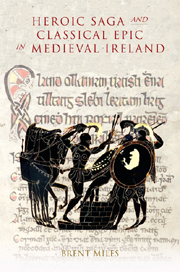Book contents
- Frontmatter
- Contents
- Acknowledgements
- Note on Texts and Editions
- Abbreviations
- Introduction: Figmenta Poetica and Heroic Saga
- 1 Classical Learning in Medieval Ireland: The State of the Question
- 2 The Irish Classical Tales: Texts and Sources
- 3 Classicism and Togail Troí
- 4 Táin Bó Cúailnge and Latin Epic
- 5 The Rhetorical Set Piece and the Breslech of the Plain of Murthemne
- Afterword: An Invitation to Study
- Bibliography
- Index
- STUDIES IN CELTIC HISTORY
2 - The Irish Classical Tales: Texts and Sources
Published online by Cambridge University Press: 12 September 2012
- Frontmatter
- Contents
- Acknowledgements
- Note on Texts and Editions
- Abbreviations
- Introduction: Figmenta Poetica and Heroic Saga
- 1 Classical Learning in Medieval Ireland: The State of the Question
- 2 The Irish Classical Tales: Texts and Sources
- 3 Classicism and Togail Troí
- 4 Táin Bó Cúailnge and Latin Epic
- 5 The Rhetorical Set Piece and the Breslech of the Plain of Murthemne
- Afterword: An Invitation to Study
- Bibliography
- Index
- STUDIES IN CELTIC HISTORY
Summary
‘Classical tales’ is a term of convenience I have adopted to designate an extremely diverse body of writings in Middle Irish. By restricting the term to works in Middle Irish I exclude a few well known items in Early Modern Irish, such as the late-fifteenth-century Stair Ercuil ocus a Bás of Uilliam Mac an Legha, and the corpus of references to classical heroes in later Bardic poetry. The contrast I draw here between Middle and Early Modern Irish, however, is not merely linguistic. Mac an Legha's work, for example, amply testifies that he was conscious of writing in a tradition which went back to the Middle Irish ‘classical tales’, and he successfully mimics their language in a few key passages. Mac an Legha's evocation of the tradition in these passages, however, contrasts with the rest of his prose and demonstrates how conscious he was of the changed literary culture of his own day. One suspects that Mac an Legha recognized an unpolished quality in the classical tales palpably anterior to his own art. Later Bardic poets mined the classical tales for classical lore, apparently confident that contemporaries knew the tales better than the original Latin sources. It seems that the classical tales in Irish, for all their imperfections and occasional inelegant finish, had become ‘classics’ in their own right for the generation that wrote in Early Modern Irish, somewhat as had Ennius for the generation of Virgil.
- Type
- Chapter
- Information
- Heroic Saga and Classical Epic in Medieval Ireland , pp. 51 - 94Publisher: Boydell & BrewerPrint publication year: 2011



